
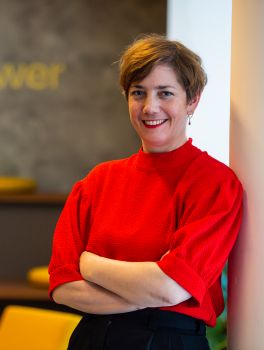
Walburga Hemetsberger receives this prestigious award for being one of the most important ambassadors for solar energy in Europe.
With a solid academic foundation in law as well as social and economic sciences from the University of Innsbruck/Austria, she has dedicated her professional career to working as a representative for various sectors, including an internship at the European Commission, in Brussels. Since 2019, she has held the position of CEO at SolarPower Europe and has successfully advocated for the deployment of solar energy across the continent, contributing to the adoption of the Solar Energy Strategy by the European Commission and the EU Solar Standard.
Ms. Hemetsberger is widely recognised for her tireless efforts in integrating solar photovoltaics into Europe’s broader energy transition and climate change strategies. With remarkable energy and enthusiasm, she has played a pivotal role in shaping EU solar policy during a critical period for the PV industry.
In addition to her policy leadership, she has been a strong advocate of the Women in PV initiative, which aims to promote and inspire female leadership in the solar sector and enhance gender diversity in the energy transition. Her influence on innovation and research initiatives, such as the Partnership for Photovoltaics, underscores her commitment to the future of renewable energy. Walburga Hemetsberger is truly an inspiring leader in this vital field.
On behalf of the Becquerel Prize Committee, we cordially congratulate Walburga Hemetsberger and thank her for her enthusiastic commitment to photovoltaics.
Prof. Dr Stefan Glunz, Chair Becquerel Committee.
The official prize ceremony will take place during the opening session of the 42nd European Photovoltaic Solar Energy Conference and Exhibition, the EU PVSEC 2025 which will take place from 22 – 26th of September 2025 in Bilbao, Spain.The Laudation speech will be given by Prof. Dr. Rutger Schlatmann from Helmholtz Centre Berlin.
The Alexandre Edmond Becquerel Prize was established in 1989 by the European Commission at the occasion of the 150th anniversary of Becquerel’s classical experiment in which he discovered the photovoltaic effect.
Its purpose is to honour scientific, technical or managerial merit in the development of photovoltaic solar energy, attained over a long period of continuous achievements, or very exceptionally, for some extraordinary invention or discovery.
It is primarily a European Award but not restricted exclusively to European citizens. The Prize is awarded periodically to a single individual. The Prize cannot be shared nor given to an institution or team.
The Becquerel Prize Committee selects the individual to be honoured with the prize. The committee is formed by:
(a) all the past awardees,
(b) the Chairperson of the Solar Energy Conference where the prize will be awarded,
(c) one representative of the European Commission,
(d) the organiser of the conference where the prize will be awarded.
The Becquerel Prize is named after Alexandre Edmond Becquereli (24 March 1820 – 11 May 1891).
Alexandre Edmond Becquerel was born in Paris and was the assistant and later the successor of his father, Antoine Cesar Becquerel, at the Museum National d’Histoire Naturelle.
In 1839, at the age of 19, he created and analyzed the world´s first photovoltaic cellii,iii in the laboratory of his father. The photovoltaic cell consisted of two electrodes in an acidic solution,
separated by a thin membrane. He illuminated one of the electrodes. Especially when the electrodes were coated with AgCl or AgBr, he could observe a significant generation of electricity.
Since he could exclude that this effect was due to temperature effects (induced by the illumination), he concluded that the light itself was the reason for his observation.
Furthermore Becquerel already discovered the influence of the spectrum of light on the photovoltaic effect; he noted that blue light yielded the highest current generation.
Alexandre Edmond Becquerel was also very active in other research related to the effects of light like photography and phosphorescence. In 1867/68 he published the important book: “La lumière, ses causes et ses effets (Light, its causes and effects)”.
________________________________
i not to be confused with his son Henri Becquerel who received the Nobel Prize in Physics for the discovery of radioactivity
ii A.E. Becquerel, "Recherches sur les effets de la radiation chimique de la lumiere solaire au moyen des courants electriques", Comptes Rendus de L'Academie des Sciences, Vol. 9, pp. 145-149, 1839; also Annalen der Physik und Chemie, Vol. 54, pp. 18-34, 1841.
iii A.E. Becquerel, "Memoire sur les effects electriques produits sous I'influence des rayons solaires", Comptes Rendus de L'Academie des Sciences, Vol. 9, pp. 561- 567, 1839; also Annalen der Physik und Chemie, Vol. 54, pp. 35-42, 1841.
(You may find a translation of publication iii into English here )
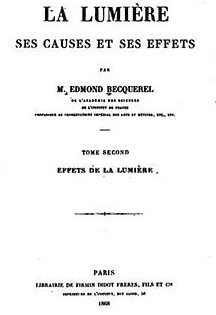
Find out more about the history of the Becquerel Prize here

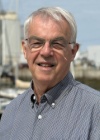 |
2024Dr. Daniel Lincot |
 |
2023Dr. Gunter Erfurt |
 |
2022Prof. Marko Topič |
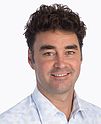 |
2020Prof. Henry Snaith |
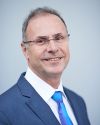 |
2019Dr. Pierre Verlinden |
 |
2018Prof. Peter Würfel |
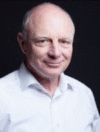 |
2017Dr. Stefan Nowak |
 |
2016Prof. Christophe Ballif |
 |
2015Prof. Andrés Cuevas |
 |
2014Dr. Stefan Glunz |
 |
2013Prof. Gabriel Sala |
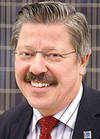 |
2012Dr. Winfried Hoffmann |
 |
2011Prof. Wim Sinke |
 |
2010Prof. Hans-Werner Schock Diploma - Becquerel Prize 2010 |
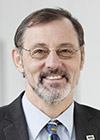 |
2009Dr. Andreas W. Bett |
 |
2008Mechtild Rothe |
 |
2007Prof. Arvind Shah Diploma - Becquerel Prize 2007 |
 |
2006Dr. Richard M. Swanson |
 |
2006Dr. Dieter Bonnet |
 |
2005Prof. Joachim Luther |
 |
2004Prof. Masafumi Yamaguchi |
 |
2003Dr. Wolfgang Palz |
 |
2001Prof. Viacheslav Andreev |
 |
2000Frederick C. Treble |
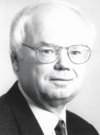 |
1998Dr. Walter Sandtner |
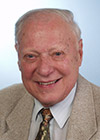 |
1997Prof. Adolf Goetzberger Diploma - Becquerel Prize 1997 |
 |
1995Dr. Karlheinz Krebs |
 |
1994Dr. Morton Prince |
 |
1992Prof. Antonio Luque |
 |
1991Prof. Werner Bloss |
 |
1989Prof. Roger Van Overstraeten |
Please download the bylaws of the Becquerel Prize committee here
The Chairman of the Becquerel Committee is Prof. Stefan Glunz at Fraunhofer ISE and University of Freiburg. Should you need additional information, please don't hesitate to contact Ms. Luisa Scherzinger or Ms. Birgit Morelle at Fraunhofer ISE (office-glunz@ise.fraunhofer.de). Webmaster: C. Ballif/N. Romano, CSEM